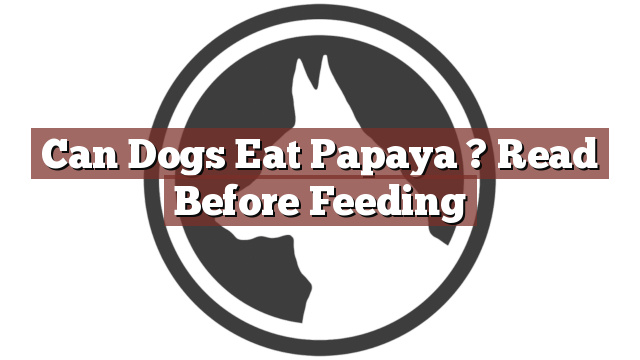Understanding Your Dog’s Dietary Needs
As responsible pet owners, it is essential to understand our dog’s dietary needs to ensure their overall health and well-being. Dogs have different nutritional requirements compared to humans, as their digestive systems are designed to process a specific combination of proteins, fats, carbohydrates, vitamins, and minerals. While it is tempting to share our favorite fruits and vegetables with our furry friends, it is crucial to know which foods are safe for them to consume. One such fruit that may pique your curiosity is papaya. But can dogs eat papaya?
Can Dogs Eat Papaya? Read Before Feeding
Can dogs eat papaya? The simple answer is yes. Papaya is safe for dogs to eat in moderation. It is a tropical fruit rich in nutrients such as vitamin C, vitamin A, folate, and dietary fiber. These nutrients can provide some health benefits to your dog, including immune system support, promoting healthy digestion, and even aiding in reducing inflammation. However, it is important to note that although papaya is generally safe for dogs, individual reactions may vary. Some dogs may develop an upset stomach or experience digestive issues after consuming papaya. Therefore, it is crucial to introduce new foods gradually and monitor your dog’s response.
Pros and Cons of Feeding Papaya to Dogs
Feeding papaya to your dog can have both pros and cons. On the positive side, papaya is low in calories and fat, making it a healthy treat option for dogs who need to maintain a healthy weight. Additionally, the presence of dietary fiber in papaya can assist in regulating bowel movements and preventing constipation in dogs. Furthermore, the antioxidants found in papaya can help combat free radicals and support your dog’s overall health.
However, it is important to consider potential drawbacks as well. Some dogs may be allergic to papaya, so it is essential to observe any signs of allergic reactions such as itching, swelling, or difficulty breathing. Moreover, feeding too much papaya to your dog can lead to digestive problems such as diarrhea or upset stomach. This is why it is crucial to offer papaya to your furry friend in moderation and as an occasional treat.
Conclusion: Considerations for Feeding Papaya to Your Dog
In conclusion, while papaya can be a healthy addition to your dog’s diet, it is important to proceed with caution. Yes, dogs can eat papaya as long as it is offered in moderation and your dog does not have any adverse reactions. Before introducing any new food into your dog’s diet, it is always wise to consult with your veterinarian. They will provide expert advice based on your dog’s specific needs and health condition. Remember, maintaining a balanced and nutritious diet for your dog is vital for their overall health and happiness.
Thank you for taking the time to read through our exploration of [page_title]. As every dog lover knows, our furry friends have unique dietary needs and responses, often varying from one canine to another. This is why it's paramount to approach any changes in their diet with caution and knowledge.
Before introducing any new treats or making alterations to your dog's diet based on our insights, it's crucial to consult with a veterinarian about [page_title]. Their expertise ensures that the choices you make are well-suited to your particular pet's health and well-being.
Even seemingly harmless foods can sometimes lead to allergic reactions or digestive issues, which is why monitoring your dog after introducing any new food item is essential.
The content provided here on [page_title] is crafted with care, thorough research, and a genuine love for dogs. Nevertheless, it serves as a general guideline and should not be considered a substitute for professional veterinary advice.
Always prioritize the expert insights of your veterinarian, and remember that the health and happiness of your furry companion come first.
May your journey with your pet continue to be filled with joy, love, and safe culinary adventures. Happy reading, and even happier snacking for your canine friend!

